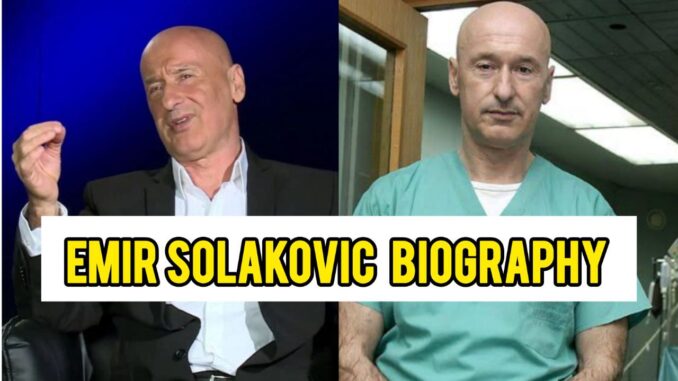
Emir Solakovic Biography
Emir Solaković was born on May 4, 1954, in Sarajevo, Bosnia and Herzegovina. Emir attended Sarajevo’s best primary and secondary schools, where he excelled in science and showed compassion for classmates who struggled. Encouraged by his parents and inspired by the city’s tradition of community service, he decided to pursue medicine. Emir Solakovic was 71 years old as of 2025.
In 1978, Emir graduated from the Faculty of Medicine at the University of Sarajevo, earning his Doctor of Medicine degree with honors. His early years of medical training were spent at the Clinical Center of the University of Sarajevo (KCUS), where he completed rigorous residency programs in general surgery and vascular surgery. These foundational years, marked by long hours and demanding cases, prepared him for the challenges ahead, both in times of peace and in the years to come.
Emir Solakovic Career
After finishing his residency, Dr. Solaković accepted a fellowship in Germany to specialize in cardiovascular and thoracic surgery. There, he learned the latest techniques in bypass surgery, aneurysm repair, and endovascular methods. His time in German hospitals exposed him to cutting‑edge technology and strict procedural standards. Returning to Sarajevo in the late 1980s, he joined the vascular surgery clinic at KCUS, quickly earning respect for his surgical skill and gentle bedside manner.
When war broke out in Bosnia in 1992, Dr. Solaković remained in Sarajevo despite the danger. Over the next three years, he performed more than 5,000 life‑saving operations under frontline conditions—often by candlelight when electricity failed and with limited supplies. His team treated both combat wounds and civilian vascular injuries, improvising solutions to keep patients alive. After the war, Dr. Solaković focused on rebuilding the clinic’s capacity, mentoring younger surgeons, and re‑establishing Sarajevo as a regional center for vascular care.
In 2004, he was appointed Head of the Clinic for Vascular Surgery at KCUS. In that role, he managed routine and complex cases, from varicose vein treatments to rare arterial malformations. He introduced minimally invasive techniques, reducing patient recovery times and hospital stays. His focus on research led to collaborations with European centers, and he authored approximately 200 peer‑reviewed articles on vascular surgery and cardiovascular care. In 2009, the Bosnia and Herzegovina Olympic Committee honored him with the Povelja with Golden Lily for his contributions to sports medicine, while business groups named him Manager of the Year for leading difficult hospital reorganizations.
In 2018, Dr. Solaković founded the Special Hospital “Dr. Solaković” in Sarajevo. This private specialty hospital combined vascular surgery with hyperbaric oxygen therapy—an innovative approach to treat chronic wounds and support post‑surgical healing. Equipped with modern operating theaters and hyperbaric chambers, the facility offered services previously unavailable in the country. Patients traveled from across the Balkans for treatment guided by Dr. Solaković’s team. Alongside his surgical practice, he held the rank of full professor at the University of Sarajevo’s Medical Faculty, where he taught courses in vascular anatomy, surgical methods, and clinical decision‑making. His textbooks became standard references for medical students and residents.
Beyond the operating room, Dr. Solaković engaged the public through media. He appeared regularly on N1 BiH’s “Pressing” and Hayat TV’s “Anatomy of Life,” offering clear, evidence‑based advice on nutrition, stress management, and recovery after COVID‑19. Known for his frank yet caring style, he demystified medical topics for viewers and encouraged healthy lifestyles.
Emir Solakovic Death
On June 29, 2025, Sarajevo lost one of its most dedicated healers when Dr. Emir Solaković passed away at the age of 71. He died peacefully in KCUS, surrounded by colleagues who had worked alongside him for decades. The specific medical cause of his death was not publicly disclosed at his family’s request. His passing sparked an outpouring of grief across Bosnia and Herzegovina.
Hospitals observed moments of silence, medical students wore black armbands, and television stations ran special tributes highlighting his wartime service and peacetime innovations. Government officials praised his role in rebuilding the health system after the war, while patients shared stories of lives saved by his steady hand. Tributes noted not only his surgical skill but also his warmth, generosity, and unwavering commitment to his country during its darkest hours.
Conclusion
Through w@r, peace, and pandemics, Dr. Emir Solaković remained committed to healing others and training the next generation. His legacy lives on in the thousands of patients he saved, the students he inspired, and the hospital he built. As Bosnia and Herzegovina faces new health challenges, the principles he championed—service, resilience, and continuous learning—will guide medical professionals for years to come.
FAQs
What were Dr. Solaković’s main contributions during the Bosnian War?
He performed over 5,000 life‑saving vascular surgeries under frontline conditions, often without reliable electricity or supplies.
What innovations did he bring to Bosnia’s medical field?
He introduced minimally invasive vascular techniques at KCUS and established hyperbaric oxygen therapy at his private hospital.
How many operations did he perform in his career?
Dr. Solaković performed approximately 20,000 operations, including routine procedures and complex wartime cases.
What role did he play in medical education?
As a full professor, he authored around 200 peer‑reviewed articles and several textbooks, mentoring medical students and surgical residents.
How did the public learn about his medical advice?
He appeared on popular TV health programs like “Pressing” and “Anatomy of Life,” delivering clear, evidence‑based guidance on nutrition, stress, and post‑COVID care.

West is both an engineer and a construction manager with a solid ten-year track record in directing building projects and managing their financial aspects. Throughout his career, he has honed his skills in coordinating multidisciplinary teams, streamlining budget processes, and structuring financing plans that ensure projects are delivered on time and within financial targets.
Leave a Reply